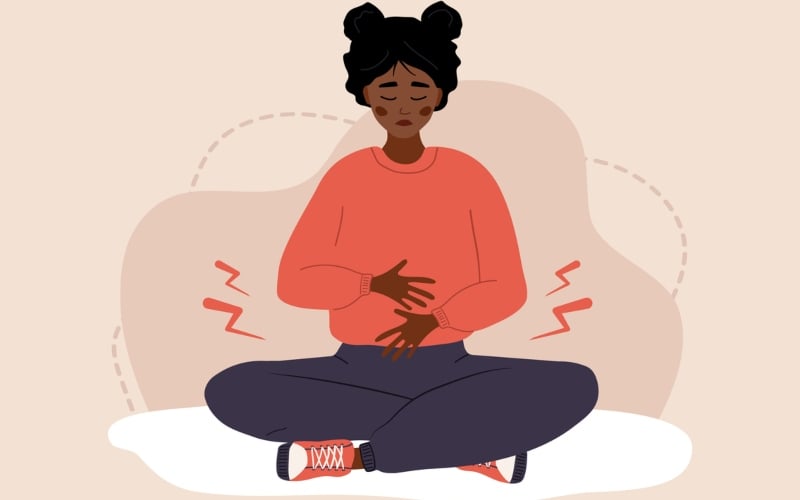Jennifer had tried everything to get rid of her psoriasis. She made major changes tp her diet and lifestyle with only modest improvements in the red, scaly patches on her hands and elbows. A 45 year old woman with 2 school-aged children, she always wore long-sleeved shirts, even in the summer. Powerful prescriptions medications did help, but only temporarily. She stopped taking these medications due to their side effects. Three months after using CPAP for her moderately severe obstructive sleep apnea, she was ecstatic to let me know that her psoriasis was finally gone. Even her joint pains were mostly gone.
Autoimmune disease is a condition when the body attacks its own tissues mistakenly, unlike a reaction to viruses, bacteria or toxins. As a result, inflammation occurs. This can happen in any part of the body. Symptoms are too numerous to list, but can can range from fatigue and lack of energy to rashes, to poor digestion, or memory loss. Various autoimmune conditions include psoriasis, rheumatoid arthritis, lupus, celiac disease, thyroiditis, multiple sclerosis, inflammatory bowel disease, and even Ménière’s disease.
The most commonly blamed reasons for autoimmune disease are genetics, toxins, certain foods, and infections. I distinctly remember learning about autoimmune diseases during medical school, and even now, the explanations by doctors for the causes and treatment for autoimmune conditions are not very satisfying. Back then, in the early 1990s, autoimmunity was relatively rare, but now it’s more common than not.
If you look up information about this on your typical medical website, you’ll see that there’s no specific pattern, explanation, diagnostic test or standard way of treatment. It’s all over the place. Notice that nowhere in the treatment section does it mention removal of potentially offending food, toxins, or irritants, but only lists various medications.
Why Traditional Explanations Fail
In our textbooks, the most common reason for autoimmune disease is stated to be from your genes. There are a myriad of genetic predispositions to various conditions, such as genes for Sjogren’s disease or HLA-DRB1 for Meniere’s disease. But notice that for most studies that link certain genes to classic autoimmune conditions, there’s a wide range of different genes, with no one certain gene. Since emphasis is placed more on your genes (rather than your environment), medical and biochemical treatment tends to be favored over environmental modifications. If most autoimmune conditions are due to our genes, then why was autoimmunity so rare even 50 years ago? This observation supports the suspicion that what’s in our environment may be a better explanation. Epigenetics is a concept that supports this idea, that your environment can modify how your genes are expressed.
There is some mention of certain foods as a culprit, such as a Western diet and sugar, but this also strengthens my argument that a radical change in our diets within the past 50 years may be a major reason for the significant increase in autoimmune conditions. Toxins are also mentioned but are limited to the most dangerous and obvious such as mercury, toxic waste products, hair dye, cadmium, and silica. Various infections have been implicated in triggering autoimmune diseases as well. Most autoimmune conditions are described as being idiopathic, meaning doctors have no idea what causes it.
Zebras and Autoimmune Disease
With the exponential rise in autoimmune conditions over the past 50 years, what else may be contributing besides what’s mentioned above? Here’s an interesting perspective from a respected stress physiologist and author of the classic best-selling book, Why Zebras Don’t Get Ulcers, by Dr. Robert Sapolsky. His proposed explanation for why autoimmunity may develop is as follows. Your immune system (white blood cells and other parts of your immune system) is constantly on the lookout for toxic, foreign, or dangerous chemicals, bacteria, viruses and fungi. Due to a previously and properly educated immune system, it reacts appropriately to the right substances, and not at all to harmless substances and tissues and cells that are part of your own body.
However, during times of intense stress (illness, family death, emotional problems, relational issues, physical pain, etc.), your body’s stress levels go up appropriately, and after a while, it comes back down to your baseline levels. However, with continued low-grade levels of stress common in modern societies, we are never able to reach normal, healthy baseline levels of hormonal and neurological stress. This “heightened” state over-activates our immune and nervous systems, causing damage to normal tissues such as the thyroid, brain, gut, or joints.
5 Reasons for Autoimmune Diseases
Rather than thinking that autoimmune diseases are caused by one particular situation, it’s likely that it’s a combination of 5 general categories:
(1) Genes. There’s no question that certain genes are associated with various autoimmune conditions. But I will argue that if you grow up with your family, it’s likely that you will be exposed to similar environmental and dietary factors. In other words, you will be exposed to similar epigenetic risk factors, on top of the genes that you inherit. In the scientific literature, it’s never been proven that having HLA-DRB1 will cause Ménière’s disease. It’s only an association. Studies only have to show that people with this gene have higher rates of Meniere’s than without this gene (3-4 times higher). Other studies have no found an association. Unfortunately, the press and the lay public end up interpreting this finding to mean that having the gene will give you Ménière’s disease. The same goes for other genes such as BRCA1/BRCA2 for breast cancer, or p53 mutation for throat cancer. Calculations are made predicting your risk of developing cancer if you have a certain gene, but consider that a condition like cancer often occurs in families or geographic clusters. Families and relatives tend to cluster together, and tend to be exposed to similar non-genetic external risk factors (described below).
(2) Shrinking Faces/Airways. In my book, Sleep Interrupted: A Physician Reveals the #1 Reason Why So Many Of Us Are Sick And Tired, I argue that modern humans have shrinking jaws with smaller upper airways. This leads to poor sleep quality and a myriad of physical, psychological and emotional health problems. There are definitely many other reasons why so many of us are sick and tired, but good breathing and sleep are the two most important pre-requisites for optimal health. Having crooked teeth due to small jaws will predispose you to various other health conditions. (For a review article on the link between obstructive sleep apnea and autoimmune diseases, click here.)
For example, one of the hallmarks of this condition is a high arched hard palate, which is a consequence of the jaws not developing fully. The roof of your mouth normally should drop down and be flat like the ceiling over your room. For the vast majority of modern Westerners, it’s more like a vaulted ceiling. The roof of your mouth is the floor of your nose, where the nasal septum sits. If there is lack of optimal downward growth of the floor of your nose, the midline nasal septum buckles to one side or the other, leading to a deviated nasal septum. The nasal sidewalls are also more narrow, since your jaws are narrow. Can a gene make you more susceptible to a high arched hard palate? If you have a high-arched hard palate and a narrow face, take a look at your grandparents’ faces, or photos from previous generations in your family or community. Notice that they had wider faces. It’s been stated by many prominent dentists that there is no gene for crooked teeth.
(3) Toxins. Doing a cursory search on Google about the toxic profiles of common offenders (fluoride, mercury, lead, aluminum, chlorine, glyphosate, etc.) can leave your head spinning. Both the medical literature as well as the lay press and media are filled with strong arguments for and against these substances. The proponents of adding fluoride to our drinking water will argue that the levels found in water are too low to cause any health problems, and that fluoride is found naturally in many areas. The same can be said for the low levels of mercury, aluminum, formaldehyde, and boric acid (Borax) in certain vaccines. Other arguments include it doesn’t stay in the body long enough or it doesn’t get absorbed, or there are no studies showing that it’s dangerous. If you do a search in the medical literature (Pubmed or Google Scholar), you will see articles and research studies supporting both sides of the argument. Many will be non-committal, stating more studies are needed. My general philosophy in these matters is to invoke the Precautionary Principle, which states that a given action should not be taken if the consequences are not conclusively known. Both sides being equal, don’t take any action until more substantial supporting evidence is available. Unfortunately, supportive studies never come about, or can take years or decades. For example, fluoride has been shown to lower thyroid functioning, but it’s not brought up if someone has hypothyroidism or has Hashimoto’s thyroiditis. Before you consider taking medications for this condition, why not try eliminating fluoride from your diet?
The next time you come across an article or research study, take the prerequisite steps that we as physicians are taught to do any time we analyze a study. Are the results valid? Were the statistics applied and interpreted appropriately? Who funded the study? Do the authors have any conflicts of interests? Oftentimes, you will never be able to uncover some of these details. In today’s times, it’s difficult to sort out real objective research from agenda-driven research.
Even if I accept that one potentially toxic ingredient is not dangerous at low levels, what if you multiplied that by 10, or even 100? It’s conceivable that a child may get multiple medications or vaccines within a short period of time, in addition to exposure to environmental toxins. What’s the end result? As far as I can tell, no one has studied this possibility. Unfortunately, science can only comment on one variable at a time, trying to eliminate all other confounding factors. By this definition, science can’t help you make decisions in many scenarios. Admittedly, It’s a given that we will cherry-pick studies to support our cases.
Regardless of pros and cons of potential toxins in our food, homes and medications, I can safely argue that these foreign substances will generate an immune response in your body, whether for a short period of time, or for a prolonged period. It’s when we’re pounded repeatedly with toxins that our body’s immune system inadvertently stays in a hyper-reactive state.
(4) Medications and Vaccines. By definition, prescription medications are synthetic and are foreign to our bodies. They WILL produce an inflammatory reaction. Despite a vast array of immensely helpful properties that modern medicine has provided, all good intentions are not without negative consequences. If you eat something that your stomach is sensitive to, or you happen to swallow a toxic substances, your body will react with pain, discomfort and generalized inflammation. This is your body’s normal reaction to a foreign “invader,” whether a toxin or a virus. Your immune system kicks into gear and will mobilize white blood cells to attack and kill, disable, or remove the foreign substance, and then later on make antibodies to protect against future attacks. Whether you take prescription medications or over-the-counter medications, you are priming your body’s immune system to be en garde against future invasions. Almost every prescription medication has potential side effects, some being very serious.
The overwhelming majority of side effects are not reported by either the patient or the doctor to the drug company. It’s just assumed that it’s “normal,” or not thought to be related. Despite the benefits that you feel from taking a specific prescription medication, every drug will affect specific areas of your body depending on how the drug compound works. For example, a selective serotonin reuptake inhibitor (SSRI), increases serotonin in your gut and brain, but like all prescription medications, it causes collateral damage, just like dropping a bomb. It may have other unintended side effects with other neurotransmitters, leading to various side effects, including weight gain, low sex drive, constipation, weakness and fatigue. Almost all of the commonly prescribed medications have documented side effects, especially if taken long-term. For example, proton-pump inhibitors have been associated with higher risk of bone fractures , kidney disease, pneumonia, and dementia. Admittedly, vaccines have done a lot to save millions of lives. Albert Camus, the French -Algerian philosopher wrote, “…good intentions may do as much harm as malevolence, if they lack understanding.”
(5) Technology. Modern technology has given us great advances in our quality of life. However, all good things come with a price. Being tethered to our computers, smartphones and tablets for the vast majority of our days has been linked to an increase in our stress levels, worsen our posture, and cause more health problems. Information on the internet can also be confusing, anxiety provoking, fear or stress-inducing. Not only is the content harmful, the technology itself has been shown to be harmful to your health. Blue light from the newer LED screens lower melatonin, your sleep hormone. It also delays your normal sleep times. Poor sleep can promote hunger for sugary, starch foods, as well as weight gain. Poor sleep in general also increases your stress levels. Moreover, we are bombarded with many electromagnetic waves simultaneously, with only increasing levels in the near future. This includes WIFI, Bluetooth, cellular, radio, power lines, LED room lights, microwave ovens, and induction stovetops. One cause for concern is that the new 5G network is in the millimeter wavelength, which overlaps with that same frequency used in microwave ovens.
Electromagnetic energy can be ionizing or non-ionizing. Ionizing radiation, such as X-rays, can cause cellular and DNA damage. 5G radiation is not thought to be ionizing, but there are still serious health concerns. Over 240 international scientists have signed for a call for stronger limited and more testing. So far, all the studies looking at cell phone use and brain tumors is mixed. As a results, experts like the American Cancer Society recommends limiting cell phone radiation exposure, if possible. All kinds of radiation can induce inflammation locally or generally in your body, to various degrees. Ideally, you should try to limit your exposure to artificial electromagnetic radiation. If you’ve ever gone camping in a remote area without any electricity or cell phone signals, you’ll see what I mean. Your feeling of being relaxed is not just from being in nature—you are not exposed to any unnatural electromagnetic radiation. You also get the benefits of natural radiation (sunlight), with its health promoting properties, including promoting Vitamin D.
Now What?
What I just described may seem a bit overwhelming. All this on top of what we’re going through with the Coronavirus pandemic. The five general areas that I addressed can cause inflammation in general. The ideas is to lower your overall risk factor that cause inflammation and stress. It’s impossible to eliminate it entirely. Go though an inventory of the last three areas one by one and make a commitment to choosing one subcategory to tackle and reduce as much as you can. The first priority is to be able to breathe better, especially through your nose. If you have trouble sleeping at night, get evaluated and treated for a possible sleep-breathing disorder. Practice good breathing techniques though regular nose breathing, deep-breathing relaxing methods, and proper posture. Layer on good habits one by one on a weekly/monthly basis. By doing this, you will see that you’ll begin to feel less stressed, more relaxed, and more in a better state of mind and body.
The post 5 Unexpected Causes of Autoimmunity appeared first on Doctor Steven Y. Park, MD | New York, NY.
Original Article










